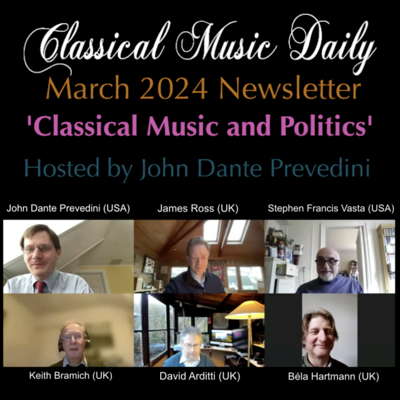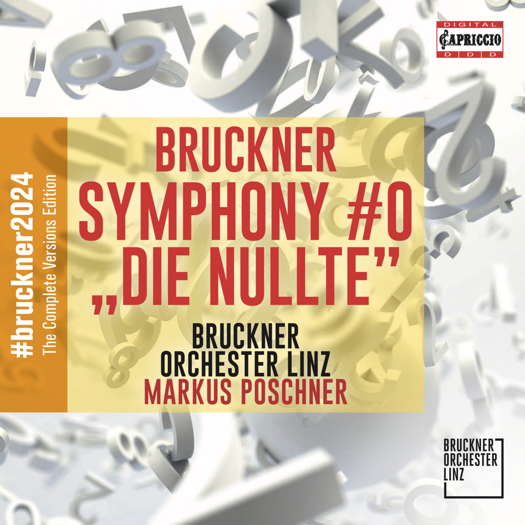- Gian Carlo Menotti
- Misha Vitenson
- National Youth Orchestra of Great Britain
- Johann Strauss Sr
- Marcello Abbado
- Haendel
- Pär Lagerqvist
- Mahler: Symphony No 10
 DISCUSSION: John Dante Prevedini leads a discussion about Classical Music and Politics, including contributions from Béla Hartmann and James Ross.
DISCUSSION: John Dante Prevedini leads a discussion about Classical Music and Politics, including contributions from Béla Hartmann and James Ross.
 UPDATES: There's a new feature every day at Classical Music Daily. Read about the various ways we can keep in touch with you about what's happening here.
UPDATES: There's a new feature every day at Classical Music Daily. Read about the various ways we can keep in touch with you about what's happening here.

A Thrilling, Epic Quality
GERALD FENECH listens to Anton Bruckner's Symphony No 0, 'Die Nullte'
'The Bruckner Orchester Linz plays superbly throughout and Markus Poschner's enthusiasm for this music allows him to reveal details of orchestration that, maybe, were hitherto missed.'
Few would seriously dispute that Anton Bruckner (1824-1896) was one of the all-time great symphonists. Indeed, his many admirers would passionately claim that in his scores the symphonic ideal reached its zenith. His music does not titillate, it does not go in for surface excitement and you will be hard pressed to find a single whistleable tune in his entire output. His orchestration is far from glamorous, he does not employ seductive harmonies and, what's more, his symphonies last up to an hour and beyond.
So what exactly can you expect from a typical Bruckner listening experience? A blisteringly wide dynamic range would be a good place to start. One minute you can be straining to hear some faint rustlings from the upper strings, the next you're being blown away by a whirlwind of sound from the brass section in full cry. Bruckner's music also possesses a thrilling, epic quality quite unlike any other. He often sets the listener up for a spectacular musical revolution, and then turns expectation on its head by taking a gentle stroll along some diverting musical tributary, all the time keeping his eye on the main event. In this way he keeps his listeners tantalised until, finally, he erupts with wave upon wave of overwhelming 'fortissimo'. There's certainly no hurrying Bruckner, but if you bear with him, you will be rewarded with some of the most utterly pure and spiritually uplifting music ever composed.
By his thirty-eighth year the composer had achieved almost nothing, but in 1862 he attended a performance of Wagner's Tannhäuser, and it changed his life forever. From now on he decided to take composition as his divine call. Bruckner was nearly fifty and still that first masterpiece eluded him, although success lay round the corner. Returning from London, he devoted himself to a concentrated five-year period of composition, writing four symphonies in sequence (Nos 2-5), which, for the first time, unmistakeably announced his novel approach to this most testing of musical forms. From this group only the Fourth scored a spectacular success, and this near rejection of his labours drove the composer into a state of confusion. Bruckner became more insecure than ever about his work, and as a result, with the well meaning of friends and colleagues, he set about a number of often drastic revisions which many now consider to have been to the detriment of the originals.
The Symphony under review bears the title Die Nullte (No 0) precisely because of this insecurity from which the composer suffered even in the very beginning of his career. The Symphony in D minor was composed between 24 January and 12 September 1869. It was initially designated to be the Second Symphony, while the C minor of 1872 was numbered No 3. According to the famous Bruckner conductor Georg Tintner, 'How an off-hand remark, when directed at a person lacking self-confidence, can have such catastrophic consequences'. Bruckner, who all his life thought that able musicians knew better than he did, was devastated when Otto Dessoff, then conductor of the Vienna Philharmonic, asked him about the first movement, 'But where is the main theme?' When in 1895 Bruckner reviewed his symphonies to have them published, he declared that this symphony 'does not count'. He wrote on the front page 'annullirt' (nullified), and replaced the original No 2 with 0. Consequently, this symphony got the nickname Die Nullte.
The D minor Symphony was premiered twenty-eight years after Bruckner's death on 12 October 1924. Naturally, this symphony has its flaws, but there is plenty to enjoy, and the music clearly points to the future masterpieces that have become staple repertoire.
Listen — Bruckner: Allegro (Symphony No 0, 'Die Nullte')
(C8082 track 1, 0:01-0:55) ℗ 2022 Capriccio :
The first movement is in sonata form with three airy tunes followed by a second that is dominated by some exquisite string writing.
Listen — Bruckner: Andante (Symphony No 0, 'Die Nullte')
(C8082 track 2, 0:01-0:58) ℗ 2022 Capriccio :
The stirring scherzo, with a gentle-sounding trio, brings us to the finale, which is excellently constructed with a couple of strong themes that foreshadow the monumental endings of his future creations.
Listen — Bruckner: Finale. Moderato (Symphony No 0, 'Die Nullte')
(C8082 track 4, 9:33-10:33) ℗ 2022 Capriccio :
The Bruckner Orchester Linz plays superbly throughout and Markus Poschner's enthusiasm for this music allows him to reveal details of orchestration that, maybe, were hitherto missed. This is a splendid third volume in Capriccio's ongoing cycle of the complete Bruckner symphonies, in exciting sound quality and detailed annotations.
Copyright © 1 March 2022
Gerald Fenech,
Gzira, Malta

CD INFORMATION - BRUCKNER: SYMPHONY NO 0, 'DIE NULLTE'
CLASSICAL MUSIC ARTICLES ABOUT AUSTRIA


